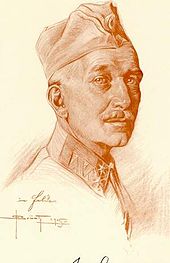Hugo Martiny from Malastów
Hugo Martiny , from 1917 Martiny von Malastów (born February 13, 1860 in Krainburg , † November 30, 1940 in Graz ) was an Austro-Hungarian officer (most recently with the rank of colonel general ).
Life
Martiny graduated from the Theresian Military Academy from 1876 to 1879 and then came to the 23rd Infantry Regiment as a lieutenant . After some time in the troop service, he was given the opportunity to attend the war school from 1884 to 1886 and thus belonged to the General Staff Corps . As a first lieutenant , he served in the staff of the 53rd Infantry Brigade in Kosice , then in the staff of the 6th Corps Command . From 1890 he served, meanwhile promoted to captain , in the central general staff in Vienna . It was not until 1899 that he returned to service and took command of a battalion of theInfantry Regiment No. 2 in Sibiu . In 1902 Martiny was promoted to Colonel and in the following year moved to Infantry Regiment No. 48 , whose command he took over in 1904.
Soon after, Martiny moved up to the top positions. In 1908 he became the commandant of the 62nd Infantry Brigade in Budapest and shortly afterwards major general . In 1912 he took command of the 14th Infantry Troop Division and was promoted to Lieutenant Field Marshal . When war broke out in August 1914, he moved out with this division and took part in the Battle of Kraśnik . In March 1915, the proven officer was entrusted with command of the 10th Corps, which secured the Carpathian ridge near Tylicz west of the Duklapass. During the decisive battle of Gorlice-Tarnów , his corps stood out on May 2, 1915, especially in the battle for the heights near Malastów, where he and German troops under General Paul von Kneussl achieved the breakthrough through the Russian positions on Zmigród . Due to this success Martiny was in his ennoblement officially the suffix "of Małastów" (1917). On June 4th, his troops, together with the 11th Bavarian Division, succeeded in retaking the Przemysl fortress . For this achievement, Field Marshal Lieutenant Martiny, together with the commander of the 11th Bavarian Infantry Division General Kneussl, was awarded the Order of the Iron Crown 1st Class with war decoration. At the beginning of July the X. Corps was regrouped to the left wing of the Austro-Hungarian 4th Army (Archduke Joseph Ferdinand ) and advanced over the bow into the area west of Lutsk . During the campaign to Rovno (September 1915) his corps advancing eastward north of Klewan was repulsed by Russian counter-attacks. On November 1, 1915, Martiny was promoted to general of the infantry .
At the beginning of the Brusilov offensive in 1916, the Russian 8th Army broke through the Austrian front at Olyka, and Martini's corps had to go back to the Styr . After the loss of Lutsk , Martini had to surrender the X. Corps to FML Friedrich Csanády von Békés on June 7 and was withdrawn from the front. Martiny held the post of military commander of Graz until August 1916 and then became inspector of the military educational institutions. It was not until August 1917 that he took over command of the troops again and commanded the XIV Corps in South Tyrol . On May 1, 1918, he rose to the rank of colonel general and took command of the kuk III. Corps, which was in action near Asiago . On November 3, 1918, the corps and its commander fell into Italian captivity.
Austrian military awards (as of December 31, 1918)
- Military Jubilee Cross 1908
- Military Jubilee Medal 1898
- Official badge for officers (2nd class)
- Badge of Honor for Services to the Red Cross (Cross of Honor 1st Class with war decoration)
- Order of the Iron Crown (III class)
- Order of Leopold (Knight's Cross with war decorations and swords)
- Military Merit Cross (2nd class with war decorations and swords)
- Order of the Iron Crown (1st class with war decorations and swords)
- Order of Leopold (Grand Cross with war decoration and swords)
literature
- Österreichisches Biographisches Lexikon 1815-1950 , Volume 6. Vienna 1974, ISBN 978-3-7001-3213-4 , p. 118
Individual evidence
- ↑ Austria - Ung. last war , text volume V. Vienna 1934, p. 398
| personal data | |
|---|---|
| SURNAME | Malastów, Hugo Martiny from |
| BRIEF DESCRIPTION | Austrian officer |
| DATE OF BIRTH | February 13, 1860 |
| PLACE OF BIRTH | Krainburg |
| DATE OF DEATH | November 30, 1940 |
| Place of death | Graz |
